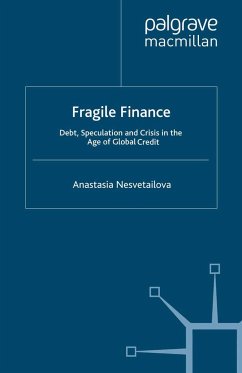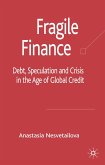Fragile Finance examines financial crisis in the era of global credit. Drawing on the work of Hyman Minsky, the book discusses the global financial system over the past decade, suggesting that financial fragility stems from an explosive combination of financial innovation, over-borrowing, and progressive illiquidity of financial structures.
'It would be enough that Anastasia Nesvetailova has brought Hyman Minsky to our attention. But she has done more: she offers a vibrant and controversial reading of why today's global financial system is unstable and prone to crisis. This is an original work that challenges how we should think about global finance. It will be read and engaged with by anyone who seeks a deep knowledge of one of the most important elements of our contemporary global political economy.' - Randall Germain, Associate Professor, Carleton University, Canada
'All observers of global finance sense its unstable foundations. In Fragile Finance, Anastasia Nesvetailova takes us to the heart of debates about this concern. Drawing on a range of case studies and theories, especially the work of Hyman Minsky, she provides a compelling argument that illiquidity remains an ever-present threat, despite the huge volumes of financial transactions. This is essential reading for students and practitioners ofglobal finance, although they may find its message disturbing.' - Dick Bryan, Associate Professor of Political Economy, University of Sydney, Australia and author of Capitalism with Derivatives: A Political Economy of Financial Derivatives, Capital and Class.
'The book explains why governments struggle to stay 'in control' using combinations of regulation or deregulation, and interest and currency exchange rates...To form your own opinion, I recommend that you read this book. It is packed with facts and is cross-referenced to a large bibliography...' - Albert Elder, Accounting Technician
'All observers of global finance sense its unstable foundations. In Fragile Finance, Anastasia Nesvetailova takes us to the heart of debates about this concern. Drawing on a range of case studies and theories, especially the work of Hyman Minsky, she provides a compelling argument that illiquidity remains an ever-present threat, despite the huge volumes of financial transactions. This is essential reading for students and practitioners ofglobal finance, although they may find its message disturbing.' - Dick Bryan, Associate Professor of Political Economy, University of Sydney, Australia and author of Capitalism with Derivatives: A Political Economy of Financial Derivatives, Capital and Class.
'The book explains why governments struggle to stay 'in control' using combinations of regulation or deregulation, and interest and currency exchange rates...To form your own opinion, I recommend that you read this book. It is packed with facts and is cross-referenced to a large bibliography...' - Albert Elder, Accounting Technician








